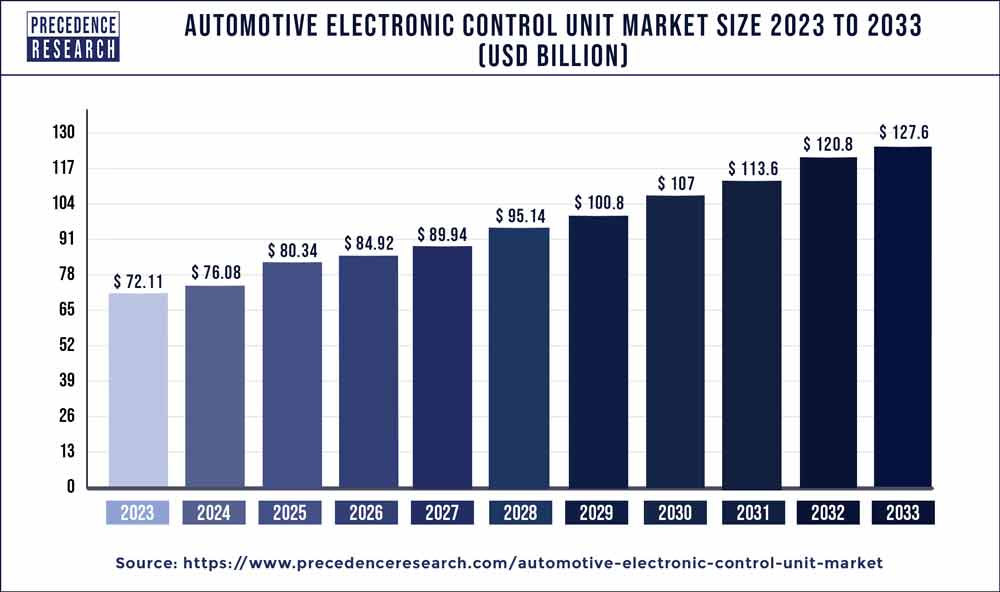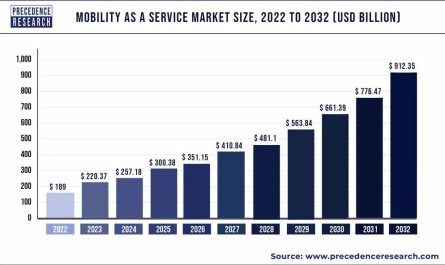The global automotive electronic control unit market size is projected to reach USD 72.11 billion by 2033 from USD 127.6 Billion in 2023, at a notable CAGR of 5.91% from 2024 to 2033.
The Automotive Electronic Control Unit (ECU) Market is a dynamic sector within the automotive industry, playing a pivotal role in the evolution of vehicle technology. ECUs serve as the brains of modern vehicles, overseeing various functions such as engine management, transmission control, safety systems, and infotainment. As automotive manufacturers strive for enhanced performance, efficiency, and connectivity in their vehicles, the demand for advanced ECUs continues to rise. This demand is fueled by evolving consumer preferences, stringent regulatory standards, and technological advancements, driving innovation and competition within the market.
Driver
Several factors drive the growth of the Automotive Electronic Control Unit Market. One significant driver is the increasing integration of electronic systems in vehicles to meet regulatory requirements for safety, emissions, and fuel efficiency. Additionally, the growing consumer demand for advanced driver assistance systems (ADAS), connected features, and autonomous driving technologies has spurred the adoption of sophisticated ECUs. Furthermore, the shift towards electric and hybrid vehicles has led to a higher demand for ECUs to manage powertrain systems and battery management, further propelling market growth.
Trends:
Several trends shape the Automotive ECU Market landscape. One prominent trend is the emergence of centralized ECUs, which consolidate multiple functions into a single unit for improved efficiency and cost-effectiveness. Another trend is the increasing demand for cybersecurity solutions within ECUs to safeguard vehicle data and systems from cyber threats. Moreover, the rise of electric vehicles has led to the development of specialized ECUs optimized for electric powertrains, battery management, and charging infrastructure. Additionally, advancements in artificial intelligence and machine learning are enabling ECUs to enhance predictive maintenance, optimize performance, and support autonomous driving capabilities.
Automotive Electronic Control Unit Market Scope
| Report Highlights | Details |
| Market Size in 2023 | USD 72.11 Billion |
| Market Size by 2033 | USD 127.6 Billion |
| Growth Rate from 2024 to 2033 | CAGR of 5.91% |
| Largest Market | North America |
| Fastest Growing Market | Asia Pacific |
| Base Year | 2023 |
| Forecast Period | 2024 to 2033 |
| Segments Covered | Product Type, Application Type, End User, Region Type |
SWOT Analysis
Strengths:
- Robust technological capabilities enabling advanced functionalities such as real-time data processing, connectivity, and sensor integration.
- Established partnerships and collaborations between automotive OEMs, semiconductor manufacturers, and technology providers driving innovation and market penetration.
- Strong emphasis on research and development (R&D) leading to continuous product enhancements and the introduction of cutting-edge features.
- Growing demand for ECUs in emerging markets due to increasing vehicle production and rising consumer purchasing power.
Weaknesses:
- Vulnerability to cybersecurity threats due to increased connectivity and data exchange within vehicles, requiring robust security measures and continuous updates.
- Dependency on semiconductor supply chains, making the market susceptible to disruptions such as chip shortages and fluctuations in raw material prices.
- Complexity in integrating ECUs across different vehicle platforms, leading to challenges in standardization and compatibility issues.
- High initial investment and development costs associated with designing and manufacturing advanced ECUs, impacting profit margins.
Opportunities:
- Expansion opportunities in the electric and autonomous vehicle segments, driven by government initiatives, environmental regulations, and technological advancements.
- Growing demand for connected car features, infotainment systems, and in-vehicle networking, creating opportunities for ECU manufacturers to diversify their product portfolios.
- Increasing focus on electrification and lightweighting in vehicles, stimulating demand for efficient powertrain and vehicle control systems.
- Rising adoption of cloud-based services and over-the-air (OTA) updates, enabling remote diagnostics, software upgrades, and personalized user experiences.
Threats:
- Intense competition from established players and new entrants, leading to price pressures and market saturation in certain segments.
- Regulatory uncertainties and evolving compliance standards impacting product development cycles and market entry strategies.
- Potential disruptions in the automotive supply chain due to geopolitical tensions, trade disputes, or natural disasters affecting production and distribution.
- Intellectual property infringements and legal challenges related to patents, trademarks, and proprietary technologies, leading to market competition and brand reputation risks.
Read Also: Automotive RADAR Market Size To Hit USD 191.53 Bn by 2032
Competitive Landscape:
The Automotive Electronic Control Unit Market is characterized by intense competition and strategic collaborations among key players to gain a competitive edge. Major players in the market include Bosch Group, Continental AG, Denso Corporation, Aptiv PLC, Magneti Marelli S.p.A., ZF Friedrichshafen AG, Hitachi Automotive Systems Ltd., Infineon Technologies AG, and NXP Semiconductors N.V. These companies focus on product innovation, R&D investments, mergers and acquisitions, and geographic expansion to strengthen their market presence and cater to evolving customer demands.
Automotive Electronic Control Unit Market Companies
- Continental AG
- Robert Bosch GmbH
- Denso Corporation
- ZF Friedrichshafen AG
- Delphi Technologies
Segments Covered in the Report
This research study predicts market revenue and its growth rate at global, regional, and country levels and gives inclusive scrutiny of the newest industry drifts in all of the sub-segments from 2021 to 2033. This report categorizes the global automotive electronic control unit market depending on different parameters such as propulsion type, vehicle type, capacity, application, and region:
By Propulsion Type
- Hybrid
- Battery Powered
- Internal Combustion Engine (ICE)
By Vehicle Type
- Commercial Vehicles
- Passenger Cars
By Capacity
- 64-Bit
- 32-Bit
- 16-Bit
By Application
- Body Electronics
- ADAS & Safety Systems
- Infotainment
- Powertrain
- Others
By Regional Outlook
- North America
- U.S.
- Canada
- Europe
- U.K.
- Germany
- France
- Asia Pacific
- China
- India
- Japan
- South Korea
- Rest of the World
Contact Us:
Mr. Alex
Sales Manager
Call: +1 9197 992 333
Email: sales@precedenceresearch.com
Web: https://www.precedenceresearch.com
Blog: https://www.expresswebwire.com/
Blog: https://www.uswebwire.com/


